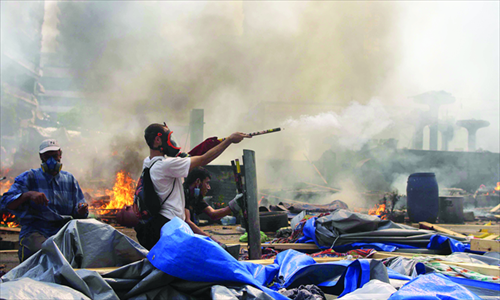HOME >> WORLD
Egypt in state of emergency
By Liu Rui in Cairo and Liu Yunlong in Beijing Source:Global Times Published: 2013-8-15 1:03:01

A supporter of the Muslim Brotherhood and Egypt's ousted president Mohamed Morsi fires fireworks toward police during clashes in Cairo on Wednesday, as security forces backed by bulldozers moved in on two huge pro-Morsi protest camps, launching a long-threatened crackdown. Photo: AFP
Egypt Wednesday declared a month-long state of emergency as violence raged across the country following a crackdown on supporters of ousted president Mohamed Morsi which has claimed scores of lives.The bloodshed marks a fresh beginning for violence in the pivotal Arab state following a six-week political standoff, and will have spill-over effects in the region, analysts said.
A statement by the presidency read out on state television ordered the army to support the interior ministry in imposing the measures.
Mohamed ElBaradei, interim vice president, resigned on Wednesday after the violent crackdown. In a resignation letter to Interim President Adly Mansour, ElBaradei said that "there were peaceful ways to end this clash in society."
Security forces Wednesday stormed two huge Cairo protest camps occupied for weeks by supporters of Morsi. The smaller camp near Cairo University was swiftly cleared in the early morning of Wednesday.
As clashes raged in the capital, three churches were attacked in central Egypt.
There have been contradicting reports about the death toll.
Egypt's health ministry said 149 were killed in the Cairo raid and clashes nationwide, and over 1,400 people had been wounded.
The Muslim Brotherhood said that 2,200 people had been killed and over 10,000 injured.
A cameraman working for Britain's Sky News was killed in the crackdown in Cairo.
General Abdel Fattah Othman, a senior interior ministry official told a local TV that they have arrested a number of Brotherhood leaders.
"It is not the end, but the beginning of violent confrontations in Egypt," Li Guofu, director of the Center for Middle East Studies at the China Institute of International Studies, told the Global Times.
The Brotherhood urged Egyptians to take to the streets to denounce the "massacre."
The White House condemned the crackdown and strongly opposed the declaration of a state of emergency in Egypt.
UN Secretary General Ban Ki-moon strongly condemned violence used by Egyptian security forces, and EU foreign policy chief Catherine Ashton also deplored the killings.
"The force taken by Egypt authorities might aggravate turbulence in the Middle East," said Li Guofu, highlighting Egypt's pivotal role in the region.
Li Weijian, director of the Institute of Foreign Policy Studies under the Shanghai Institutes for International Studies, told the Global Times that the confrontation in Egypt would have implications for countries across the region which are trying to find their own path in the wake of the Arab Spring. "Some countries in the region, which are about to go through transition, will learn from the lessons of Egypt, and they will be vigilant toward earthshaking revolutions," he said.
Morsi was Egypt's first freely elected leader. His overthrow serves as a reminder of the immaturity of Egypt's democratic transition, said experts.
Li Weijian said both Morsi and the military "don't have a mature philosophy about democracy and it seems that Egypt isn't ready [for the change]."
Meanwhile, the expert also said Egypt's clashes contain lessons for other countries.
"China can also learn something from the turbulence of Egypt, which proves again that stability is the basis for reform," said Li Weijian.
Agencies contributed to this story
Key developments since ouster of Morsi
July 3
Defense minister and army chief General Abdel Fattah al-Sisi ousts Morsi after a wave of protests and appoints a caretaker president, chief justice Adly Mansour. Morsi is detained along with his guards at the defense ministry.
July 5
Muslim Brotherhood supreme guide Mohammed Badie says “millions” of protesters will stay mobilized until Morsi’s return and condemns the takeover as a “military coup.”
July 16
An interim government that includes no Islamist parties is sworn in.
July 26
A court orders Morsi’s detention for questioning over suspected ties with Palestinian militant group Hamas in prison breaks and attacks on police.
July 27
Eighty-one civilians and a police officer killed during clashes in Cairo, at a demonstration in support of Morsi.
July 30
EU foreign policy chief Catherine Ashton meets Morsi at an undisclosed location.
August 8
On the first day of the Eid al-Fitr holidays to mark the end of Ramadan, thousands of Morsi supporters take part in prayers and festivities in the capital’s Rabaa al-Adawiya and Al-Nahda Squares.
August 12
Egypt’s judiciary said it would extend Morsi’s detention for another 15 days.
AFP – Global Times
Posted in: Africa